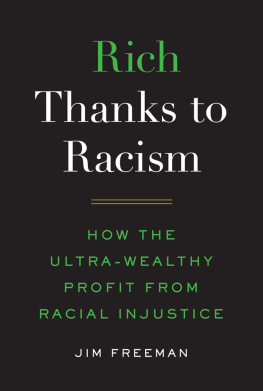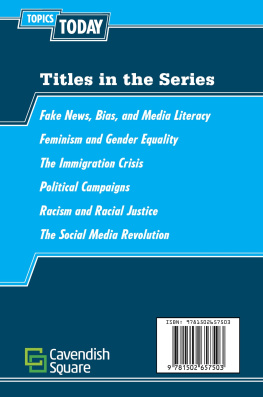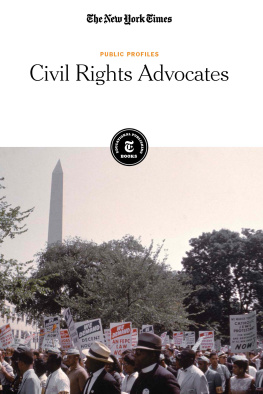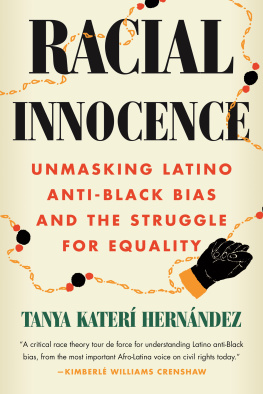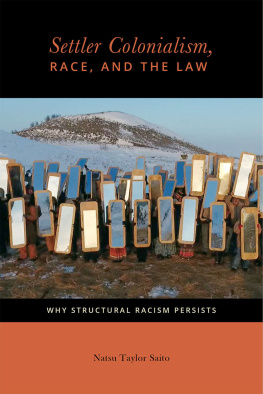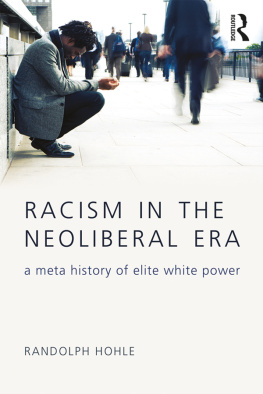
Copyright 2021 by Cornell University
All rights reserved. Except for brief quotations in a review, this book, or parts thereof, must not be reproduced in any form without permission in writing from the publisher. For information, address Cornell University Press, Sage House, 512 East State Street, Ithaca, New York 14850. Visit our website at cornellpress.cornell.edu.
First published 2021 by Cornell University Press
Printed in the United States of America
Library of Congress Cataloging-in-Publication Data
Names: Freeman, Jim, 1976 author.
Title: Rich thanks to racism : how the ultra-wealthy profit from racial injustice / Jim Freeman.
Description: Ithaca, [New York] : ILR Press, an imprint of Cornell University Press, 2021. | Includes bibliographical references and index.
Identifiers: LCCN 2020033574 (print) | LCCN 2020033575 (ebook) | ISBN 9781501755132 (hardcover) | ISBN 9781501755156 (pdf) | ISBN 9781501755149 (epub)
Subjects: LCSH: Race discriminationEconomic aspectsUnited States. | RacismEconomic aspectsUnited States. | MinoritiesUnited StatesEconomic conditions. | United StatesRace relationsEconomic aspects.
Classification: LCC E184.A1 F7347 2021 (print) | LCC E184.A1 (ebook) | DDC 330.9730089dc23
LC record available at https://lccn.loc.gov/2020033574
LC ebook record available at https://lccn.loc.gov/2020033575
To all those who are willing to fight
for a better and more just world
Preface
In the summer of 2020, there were two significant developments in US race relations, the first of which was unprecedented and the second of which has been repeated countless times across our history.
First, following the killing of George Floyd on May 25th, for the first time ever in the United States, there was widespread public recognition of the existence of systemic racism. Proclaiming ones support for ending racial injustice became so trendy that seemingly every corporation and policy maker in the United States issued a public statement in support of the Black Lives Matter movement.
Second, by July, as has happened over and over again, our collective attention to systemic racism had quickly and substantially waned. The mainstream media had largely moved on from covering this issue. Most of those newly woke corporations were back to business as usual once the protests were over and the process of actually eliminating the racist policies and practices being protested had begun. And the vast majority of policy makers were doing what they nearly always do in the face of protest: figuring out the bare minimum amount of change needed to quell the uprising and get things back to normal.
When faced with such widespread loyalty to a profoundly unjust status quo, it is unclear how much progress those who remain committed to racial justice will be able to make in the coming months and years. As of the time of this writing (August 2020), I am optimistic that the uprising being led by the communities most impacted by systemic racism will be able to create the waves of transformative change that are so obviously necessary and overdue. I am, however, also realistic about the need for many more peopleof all races and ethnicitiesto become active members and supporters of the racial justice movement before we will truly be able to eradicate systemic racism from US society.
This book is for all those who think they might want to become part of that effort. Make no mistake: in the coming years, we have a chance to institute the most significant social change in US history. Of all the things we could accomplish as a country, of all the milestones we could achieve, of all the injustices we could remedy, none would be more significant than dismantling the centuries-old systemic racism that continues to devastate and marginalize tens of millions of people of color across the United States. It is the foremost challenge of our lifetimes to not merely be content in saying black lives matter, but to collectively step up and truly actualize those words. I sincerely hope that you will find a way to contribute whatever you can to this movement and that this book can be helpful to you along the way.
Introduction
Strategic Racism
I can only hope that other people are not as resistant to the conclusions reached in this book as I would have been if I had read them ten years ago.
Back then, I wouldnt have wanted to believe them. The implications would have been too much for me to handle. While I certainly wish I could say that, as a longtime civil rights lawyer, I have always had a clear understanding of the causes of racial inequality, that would be a lie. I now know that, for much of my career, I didnt fully appreciate what people of color were up against. I was working alongside predominantly black and brown communities all across the United States, helping to fight the injustices they faced as best I could, but in truth I didnt really have a clear grasp of who and what we were fighting. At the time, I thought that the biggest obstacle to justice was ignorance. That is what I believed to be our greatest enemy. It was only much later in my career that I realized that what we were really fighting against was much, much worse than that.
How do we explain our racial divide in the United States? Where does it come from? Why does it persist? For me, the answers to those questions used to be found in grainy news footage of Bull Connor turning his fire hoses and attack dogs against children in Birmingham, or of state troopers and civilians brutally beating marchers on Bloody Sunday in Selma. I could find more than enough explanation in the videos of the Arkansas National Guard being used to prevent the integration of Little Rock schools, and of Governor George Wallace of Alabama proudly proclaiming his support for segregation now, segregation tomorrow, and segregation forever.
Over time, though, I came to realize that justice wasnt quite so forthcoming, and that the moral arc wasnt bending in the ways I anticipated. However, this realization didnt come from losing the struggle for equality. It came from winning, or at least from what we typically think of as winning.
For many years, my work has been devoted to supporting grassroots movements to eliminate systemic racism and create positive social change. At the center of those efforts have been advocacy campaigns to advance the most critical priorities of communities of color, such as achieving education equity, ending mass incarceration, protecting immigrants rights, dismantling the school-to-prison pipeline, and creating a more inclusive and participatory democracy. The leaders of these campaigns have been youth and adults from some of the most politically and economically marginalized communities in the country. These are the neighborhoods that American society typically does its very best to ignore, such as the predominantly black and brown sections of Chicago, New York, Miami, Los Angeles, Denver, Philadelphia, Oakland, Jackson, New Orleans, Phoenix, Newark, and Baltimore, among many other places. Yet because of these community leaders remarkable perseverance and fierce devotion to their people, they have won many, many significant and even groundbreaking victories. They have notched so many wins that one would naturally assume that the racial inequities they face would have substantially diminished or even disappeared by now. However, even after all these years, and staggering sacrifices by the individuals who led those efforts, it is difficult to make the case that those communities are better off than when we started.
That is not to say that those victories didnt represent significant steps forward, or that they havent produced many undeniably positive effects. They did, and they have. Its just that for every two steps forward these communities have been able to make, there are other forces at work that are quick to push them two steps back, if not more.
Next page
